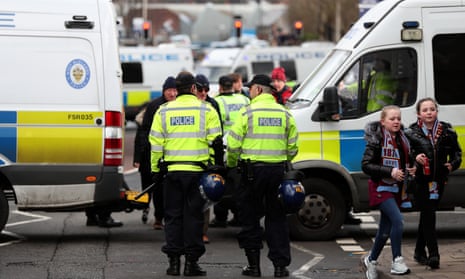A meet and greet service from your car or nearest Tube station. A hotline to your local bobby, whose location you can track on your iPad. Dedicated patrols. A 100% conviction rate.
For up to £200 a month, this is what residents on some of London’s most expensive streets in Belgravia, Mayfair and Kensington can sign up for with TM Eye, Britain’s first “private police force”.
I have nothing against TM Eye, which is run by retired police officers, and which appears to have a laudable track record in private prosecutions – mainly in fraud and intellectual property theft, although it has reportedly recently moved on to other sorts of crime investigations, including missing people, blackmail and rape.
It is perhaps worth noting that most low level or domestic fraud cases are not dealt with by individual police forces, so a direct comparison of conviction rates cannot be made. Furthermore, if claims are being pursued in the civil courts, these would enjoy a lower burden of proof than criminal cases. Some might argue we live in a democratic society and the public are entitled to choose and pay for residential services of their own choice, whether that means opting for Tesco food deliveries over Ocado, or picking EDF instead of British Gas.
But this is dangerous territory, where the amount of money you have determines the service you get. I, for one, do not want to police a world where the haves and have-nots are treated differently – and I know most of my fellow officers would agree. We cannot have a two-tier system.
Policing is not a consumer or lifestyle issue. Nor should it be the exclusive domain of the wealthy. When Sir Robert Peel introduced the first full-time, professional and centrally organised police force in the 1820s, that was not what he had in mind.
I am, however, not naive enough to ignore the issues that have created a marketplace for TM Eye in the first place. That is the real scandal – that successive governments have allowed a once-proud police service to be eroded year after year, with 21,000 fewer officers now than we had in 2010.
That is set against a backdrop of increasing crime, especially violent crime – the latest figures show knife crime is up by 21% year on year and gun crime by 20%. Domestic burglaries are up by almost a third.
Faced with those figures, I can see why those who can afford it might be tempted to hire a private service. But looking to a private force to bridge the gap ignores the numerous other roles police officers fulfil as they serve the public: countering terrorists who seek to attack our way of life; managing sex offenders in the community; preventing child sexual exploitation; looking for missing persons; dealing with people with mental health problems; policing football matches, pubs and clubs; making house to house inquiries and taking statements. There is also a danger that private security firms and patrols that move into these areas do not have the same safeguards that are well established within the police force.
Instead of justifying an increased demand and market for a private force, what rising crime figures show is just how much our current service is creaking, despite the hard work of our officers. The pressure of ongoing austerity cannot continue.
The toll on officers’ health and wellbeing over the past seven years has been momentous. Officers are demoralised and despondent. Our 2017 survey [pdf], taken by more than 30,500 officers, revealed that 60% have low morale, a significant increase on the previous year, and more than two thirds do not feel valued in the police. More than 12% said they planned to leave the service as soon as possible or within the next two years. In real terms, police pay has also dropped by around 15% since 2010. There are officers who have to contact welfare schemes to buy petrol to get to work, or to put food on the table for their families.
In December, the government announced a £450m increase in the proposed police budget allocation across England and Wales. There is an element of smoke and mirrors about this. The money is desperately needed, but will be paid for by sourcing budgets from existing local authority budgets and increasing council tax. The deal also requires the service to find a further £100m in savings through “smarter procurement” of everything from police vehicles to uniforms.
The country needs to have a proper debate now about the type of police service it wants. Something has to change. We are overstretched and underfunded and cannot continue like this. The government needs to stop ignoring that reality and give the public the police service it deserves.
This series aims to give a voice to the staff behind the public services that are hit by mounting cuts and rising demand, and so often denigrated by the press, politicians and public. If you would like to write an article for the series, contact emma.sheppard.casual@theguardian.com.
Sign up for your free Guardian Public Leaders newsletter with comment and sector views sent direct to you every month. Follow us: @Guardianpublic
Looking for a job in central or local government, or need to recruit public service staff? Take a look at Guardian Jobs.
